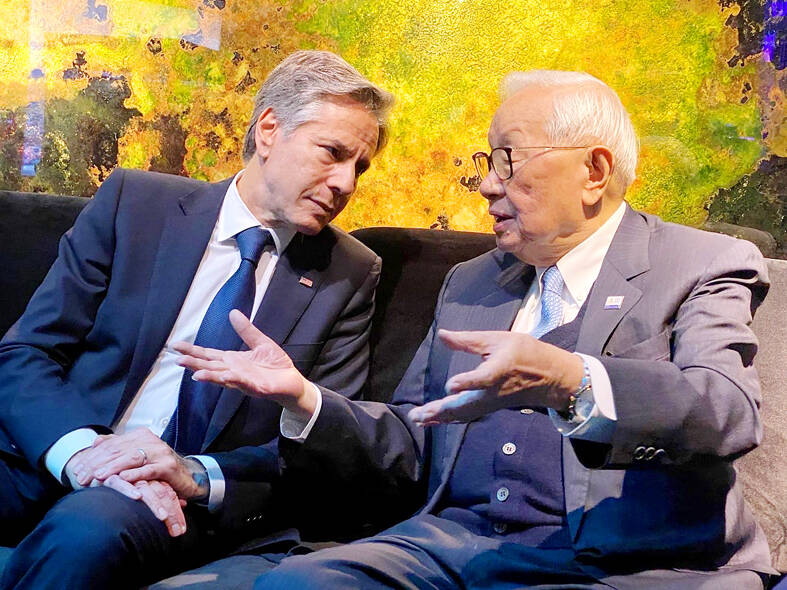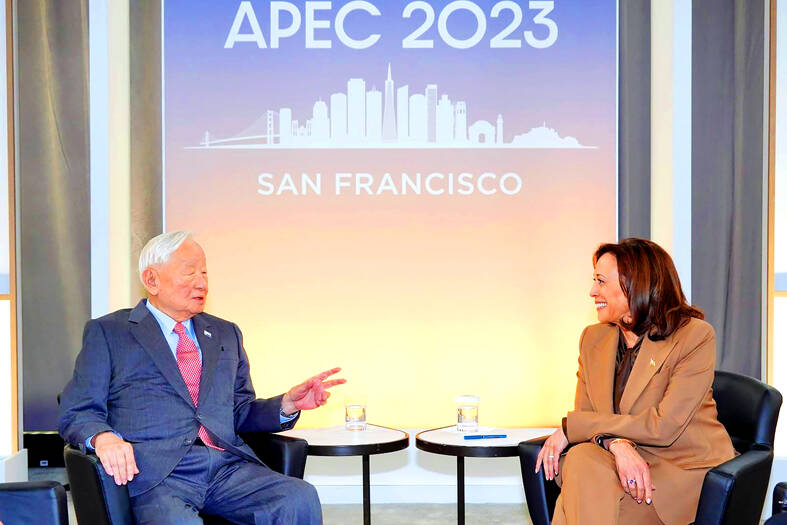Taiwan Semiconductor Manufacturing Co (TSMC) founder Morris Chang (張忠謀), who is representing Taiwan at the APEC summit in San Francisco, on Thursday met with White House National Economic Council Director Lael Brainard to discuss economic ties between Taipei and Washington.
Chang met with Brainard on the sidelines of the summit and discussed a range of economic topics, the Taiwanese delegation to the APEC Economic Leaders’ Meeting said.
Brainard, who previously served as vice chair of the US Federal Reserve, is responsible for supervising the implementation of infrastructure projects and the Creating Helpful Incentives to Produce Semiconductors and Science Act (CHIPS).

Photo courtesy of the Taiwanese delegation to APEC
Included in the CHIPS Act are US$39 billion in subsidies to companies to build new facilities and expand operations in the US, including for TSMC, which is building two advanced wafer fabs in Arizona.
Chang and Brainard met for about 40 minutes. Other Taiwanese officials in the meeting were Representative to the US Hsiao Bi-khim (蕭美琴), National Security Council Deputy Secretary-General Hsu Szu-chien (徐斯儉), Minister Without Portfolio John Deng (鄧振中) and Minister of Finance Chuang Tsui-yun (莊翠雲).
On Wednesday, Chang spoke with US Secretary of State Antony Blinken at an APEC reception, the delegation said.

Photo courtesy of the Taiwanese delegation to APEC
Chang was yesterday scheduled to meet with Singaporean Prime Minister Lee Hsien Loong (李顯龍), said his wife, TSMC Charity Foundation chairperson Sophie Chang (張淑芬).
Morris Chang also spoke with US Vice President Kamala Harris on Thursday for about 20 minutes between meetings, Presidential Office spokesman Alex Huang (黃重諺) said.
They exchanged views on the overall economic environment and how to strengthen economic cooperation between Taiwan and the US in the hopes of contributing to the continued prosperity of the Indo-Pacific region, Huang said.
Earlier this week, Deng said that Taiwan’s bilateral talks with other APEC members at the forum were aimed at building up support for Taiwan’s participation in the Comprehensive and Progressive Agreement for Trans-Pacific Partnership (CPTPP).
On Tuesday, National Development Council Minister Kung Ming-hsin (龔明鑫) met with US Undersecretary of State for Economic Growth, Energy and the Environment Jose Fernandez on the sidelines of the APEC Ministerial Meeting to discuss Taiwan-US cooperation.
During the event, Fernandez touched on a variety of topics, including the upcoming annual US-Taiwan Economic Prosperity Partnership Dialogue, avoidance of double taxation and the US-Taiwan Initiative on 21st Century Trade, Kung said.
The US undersecretary also expressed hope that the US-Taiwan economic partnership could expand to include third countries — especially on collaboration in the field of 5G network, net zero emissions and healthcare — to demonstrate the benefits of working with Taiwan to the world, he added.
Kung said he told Fernandez that Taiwan has already been working to promote cooperation with third countries, citing medical and health-related cooperation with New Southbound Policy countries.
The two officials also exchanged opinions on the issue of economic coercion, which Fernandez described as being a major concern for G7 nations, Deng said.
Deng and Kung were Taiwan’s representatives to the APEC Ministerial Meeting.
APEC is an important platform for Taiwan because it allows the country to hold in-person discussions with ministers from other countries, Deng told a news conference on Wednesday, adding that those who have joined the CPTPP are also APEC members.
Taiwan is willing to meet the high standards set by the CPTPP, which requires that members ensure their domestic economic policies are in line with the decrees of the trade pact, Deng said.
Discussing the Ministerial Meeting, Kung said they shared Taiwan’s experience in digital transformation and deploying artificial intelligence (AI) to enhance the quality of medical care.
Taiwan is committed to bridging the digital gap and strengthening digital resilience in light of the increasing influence of AI, Kung said.
Regarding the Indo-Pacific Economic Framework for Prosperity (IPEF) ministerial meeting, which was also held in San Francisco this week, Deng said that Taiwan would continue on its current development path as it seeks to join the initiative.
The Washington-initiated IPEF was launched by Biden on May 23 last year to enhance the US’ economic engagement in the region. It was launched with 14 founding member nations, not including Taiwan, but is open to accepting new members.
Taipei has said the decision to exclude Taiwan was regrettable, as the nation is an important economy that plays a crucial role in global supply chains and should therefore be included.
Additional reporting by Hsu Tzu-ling

South Korean K-pop girl group Blackpink are to make Kaohsiung the first stop on their Asia tour when they perform at Kaohsiung National Stadium on Oct. 18 and 19, the event organizer said yesterday. The upcoming performances will also make Blackpink the first girl group ever to perform twice at the stadium. It will be the group’s third visit to Taiwan to stage a concert. The last time Blackpink held a concert in the city was in March 2023. Their first concert in Taiwan was on March 3, 2019, at NTSU Arena (Linkou Arena). The group’s 2022-2023 “Born Pink” tour set a

CPBL players, cheerleaders and officials pose at a news conference in Taipei yesterday announcing the upcoming All-Star Game. This year’s CPBL All-Star Weekend is to be held at the Taipei Dome on July 19 and 20.

The Taiwan High Court yesterday upheld a lower court’s decision that ruled in favor of former president Tsai Ing-wen (蔡英文) regarding the legitimacy of her doctoral degree. The issue surrounding Tsai’s academic credentials was raised by former political talk show host Dennis Peng (彭文正) in a Facebook post in June 2019, when Tsai was seeking re-election. Peng has repeatedly accused Tsai of never completing her doctoral dissertation to get a doctoral degree in law from the London School of Economics and Political Science (LSE) in 1984. He subsequently filed a declaratory action charging that

The Hualien Branch of the High Court today sentenced the main suspect in the 2021 fatal derailment of the Taroko Express to 12 years and six months in jail in the second trial of the suspect for his role in Taiwan’s deadliest train crash. Lee Yi-hsiang (李義祥), the driver of a crane truck that fell onto the tracks and which the the Taiwan Railways Administration's (TRA) train crashed into in an accident that killed 49 people and injured 200, was sentenced to seven years and 10 months in the first trial by the Hualien District Court in 2022. Hoa Van Hao, a